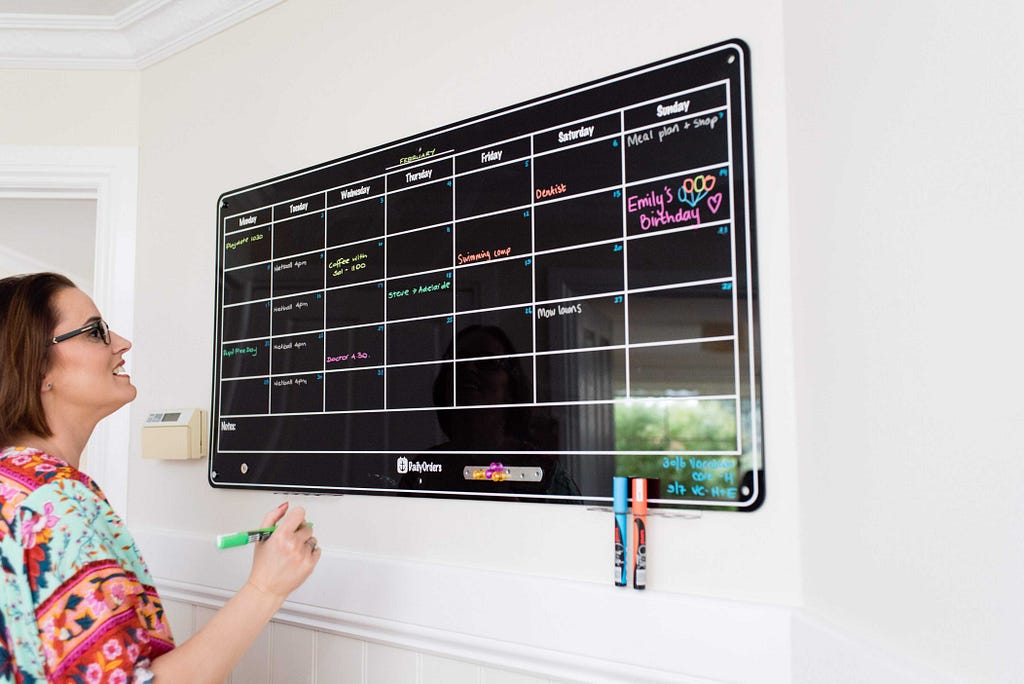Female Disruptors: Kelly Walter of Daily Orders On The Three Things You Need To Shake Up Your Industry
An Interview With Candice Georgiadis

Assumptions about women in business. I really hate it when people ask me, ‘How is your little business going?’. Would they say that to a man? Unlikely. We turn over $1 million in revenue per year and employ three people full-time — that’s not small in my books. There is this assumption that because I’m a woman and my business supports my parents, it must be small or in some people’s eyes, even a hobby! It’s wrong and we need to challenge these assumptions. We’re in a growth phase and not slowing down anytime soon. It’s time for assumptions to catch up.
As a part of our series about women who are shaking things up in their industry, I had the pleasure of interviewing Kelly Walter of Daily Orders.
Kelly Walter is the founder of Daily Orders, a Australian-based business selling time-saving planners for busy families. As a busy mum herself, Kelly knows first-hand the importance of being organised and has made it her mission to help other families achieve a better work/life balance by helping embracing the ‘Daily Orders’ method.
Thank you so much for doing this with us! Before we dig in, our readers would like to get to know you a bit more. Can you tell us a bit about your “backstory”? What led you to this particular career path?
The mental load has been an invisible weight that women have carried for generations, and it’s time for change. When I was on maternity leave with our second child, one question kept running through my mind: how would I ever get anything done again? Why can’t I handle this? So, I turned to a planning hack used in the Navy where I’d worked for many years as a Naval Logistics Officer called ‘Daily Orders’ to help me take back control of my life. In the Navy, Daily Orders is the primary method of communicating. Published daily, it tells everyone exactly what is happening and when. I wanted to test whether it could make life that bit easier with a baby at home and it worked. I took this concept and created Daily Orders family wall planners for parents just like me.
Can you tell our readers what it is about the work you’re doing that’s disruptive?
We manufacture and sell a range of family wall planners that help families get organised, display all the things that need to be done, and make it fun too! The work we do is disruptive because we are changing the way families operate on a day-to-day basis. We are giving parents the tools they need to take back control of their lives and share the load with the rest of the family.
Can you share a story about the funniest mistake you made when you were first starting? Can you tell us what lesson you learned from that?
It’s only funny in hindsight, but at the time it was a disaster! I had arranged a major collaboration with a huge Australian Thermomix group to co-design a menu planner to go on the fridge. We’d never mounted our planners with magnets but the demand was huge so we naively gave it a go. After sending out more than 300 planners, they started falling off people’s fridges. Of course, we received a bunch of complaints and despite doing my research and testing, it turns out that these strip magnets weren’t suitable for actually mounting anything, rather they were just meant to be stuck on racking for electrical cables. The lesson I learned here was to always triple test your products before you launch them and to trust my gut. I knew I didn’t want to use button magnets as they are a common choking hazard, but I was swayed by the customer’s desire to have magnets. Always listen to your gut!
We all need a little help along the journey. Who have been some of your mentors? Can you share a story about how they made an impact?
I started out listening to James Tuckerman from The B2B Group who is an exceptional businessman. He helped me grow my audience on Facebook and generate sales through Facebook ads. The biggest lesson I learned from him was ‘not to propose on the first date’ i.e. it is highly unlikely that the first time someone sees your product that they will buy. You need to warm them up first, by giving value and letting them know, like, and trust you, before you ask them to give over their hard-earned dollars. More recently, I’ve been working with business coach Lisa Jones to work on my business, to help me get out of working in the business. She encourages me to make better use of my time, outsource where I need to, or where I am not skilled, and really delve into the numbers behind the business to work out what needs improvement.
In today’s parlance, being disruptive is usually a positive adjective. But is disrupting always good? When do we say the converse, that a system or structure has ‘withstood the test of time’? Can you articulate to our readers when disrupting an industry is positive, and when disrupting an industry is ‘not so positive’? Can you share some examples of what you mean?
I generally believe that disrupting an industry is positive when innovation leads to improved outcomes for consumers. In the parenting space, there are a lot of products and services that have largely remained unchanged for decades, despite the fact that families have become more diverse and parents have less time and more obligations than ever. The needs of parents will continue to change, and we need to be prepared to change with them.

Can you share 3 of the best words of advice you’ve gotten along your journey? Please give a story or example for each.
- Never propose on the first date — it is going to take time for people to warm up to you and trust you and your brand. They’ve worked hard for their money so you need to work hard to get them to trust you with it.
- Numbers don’t lie — You can have all the feelings you like about how you think business is going, but when you look at the numbers, your truth will appear.
- Avoid having all your marketing eggs in one basket — Facebook Advertising was initially our main source of customer acquisition and it worked really well for us. But as our business has grown, so have our marketing channels. Since the iOS14 privacy upgrade and significant changes in privacy settings, advertising through Facebook has, for us, become unreliable and expensive. Diminished reporting capabilities mean it’s hard to attribute which ad made a sale. This has made the job of making informed data-driven decisions very difficult in our experience. We’re now exploring other advertising channels such as Pinterest and public relations to help us reach untapped markets.
We are sure you aren’t done. How are you going to shake things up next?
We’re looking at new products to support our National Disability Insurance Clients with their independence, communication, and organisation. We’ve also got another product coming soon which we’re excited about as it will complement our planners beautifully!
In your opinion, what are the biggest challenges faced by ‘women disruptors’ that aren’t typically faced by their male counterparts?
Assumptions about women in business. I really hate it when people ask me, ‘How is your little business going?’. Would they say that to a man? Unlikely. We turn over $1 million in revenue per year and employ three people full-time — that’s not small in my books. There is this assumption that because I’m a woman and my business supports my parents, it must be small or in some people’s eyes, even a hobby! It’s wrong and we need to challenge these assumptions. We’re in a growth phase and not slowing down anytime soon. It’s time for assumptions to catch up.
Do you have a book/podcast/talk that’s had a deep impact on your thinking? Can you share a story with us?
No — to be honest!
You are a person of great influence. If you could inspire a movement that would bring the most amount of good to the most amount of people, what would that be? You never know what your idea can trigger. 🙂
Donate what you don’t need. Ultimately a lot of business owners are in business to make a living for themselves, but if you don’t need a bazillion dollars, there are always people who do. We currently donate a percentage of revenue to SoldierOn to help veteran mental health and rehabilitation which is something I’m particularly passionate about after my time in the Navy.
Can you please give us your favorite “Life Lesson Quote”? Can you share how that was relevant to you in your life?
You can’t afford to worry about what you can’t control. My husband and I met when we had both broken-off engagements. We sat on the floor of his apartment in Sydney one day when we were just going out and looked at each other and said, “Are we doing this — are we together?”. The answer was a resounding yes, but we needed to get out of our own heads and stop worrying about the past in order to move forward. So we came up with this phrase, “you can’t afford to worry about things you can’t control” and we have used that throughout our 12-year (so far) marriage.
How can our readers follow you online?
On Instagram, Facebook, and on LinkedIn. To browse our range of family planners, please visit: https://www.dailyorders.com.au/
This was very inspiring. Thank you so much for joining us!
Female Disruptors: Kelly Walter of Daily Orders On The Three Things You Need To Shake Up Your… was originally published in Authority Magazine on Medium, where people are continuing the conversation by highlighting and responding to this story.

